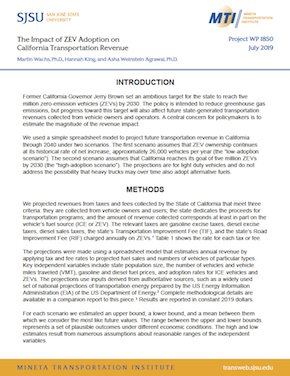- 408-924-7560
- mineta-institute@sjsu.edu
- Donate
The Impact of ZEV Adoption on California Transportation Revenue
To reduce greenhouse gas emissions, California is pursuing the ambitious goal of adopting five million zero-emission vehicles (ZEVs) by 2030. Progress toward this target will affect future state-generated transportation revenues collected from vehicle owners and operators. This paper uses simple spreadsheet models to estimate how different rates of ZEV adoption will impact state-generated transportation revenues. We project future transportation revenue in California through 2040 under two scenarios. The first scenario assumes that ZEV ownership continues at its historical rate of net increase, approximately 26,000 vehicles per year. The second assumes that California reaches its goal of five million ZEVs by 2030. The projections show that the user fees levied on ZEVs by provisions of SB1 can replace and potentially even exceed the revenue to the state that will be lost because of declining gasoline sales tax revenue.
MARTIN WACHS, PhD
Dr. Wachs is Distinguished Professor Emeritus of Civil & Environmental Engineering and of City and Regional Planning at the University of California, Berkeley, where he directed the Institute of Transportation Studies. He earlier spent 25 years at UCLA, where he was Chairman of the Department of Urban Planning for eleven years. After retiring from the University, he became the Director of the Transportation, Space, and Technology Program at the RAND Corporation in Santa Monica. Wachs is semi-retired, teaching courses and conducting research at UCLA in transportation policy and working on transportation policy projects at RAND. Wachs currently serves as a member of both the California High Speed Rail Peer Review Group and the Technical Advisory Committee for the California Road Charge Pilot Program.
HANNAH KING
Ms. King is currently a PhD student in transportation planning and policy at UCLA. Prior to UCLA, she earned a Master’s in Urban and Regional Planning and a Master’s in Geographic Information Systems from Florida State University. King was previously employed at the Florida Department of Economic Opportunity, where she worked to produce guidance for local communities planning for the impacts of sea-level rise.
ASHA WEINSTEIN AGRAWAL, PhD
Dr. Agrawal is the Director of the MTI National Transportation Finance Center and also Professor of Urban and Regional Planning at San José State University. Her research and teaching interests in transportation policy and planning include transportation finance, bicycle and pedestrian planning, and travel survey methods. Agrawal also works in the area of transportation history. She has a B.A. from Harvard University in Folklore and Mythology, an M.Sc. from the London School of Economics and Political Science in Urban and Regional Planning, and a PhD from the University of California, Berkeley, in City and Regional Planning.
-
Contact Us
San José State University One Washington Square, San Jose, CA 95192 Phone: 408-924-7560 Email: mineta-institute@sjsu.edu






